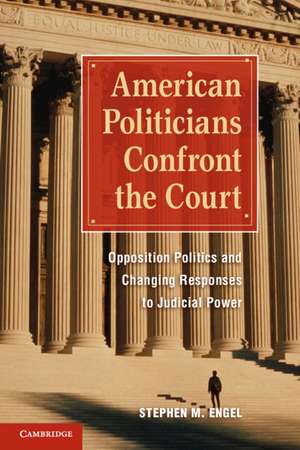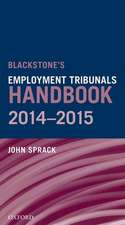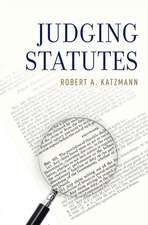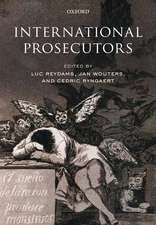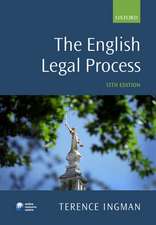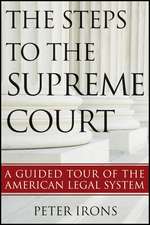American Politicians Confront the Court: Opposition Politics and Changing Responses to Judicial Power
Autor Stephen M. Engelen Limba Engleză Paperback – 12 iun 2011
| Toate formatele și edițiile | Preț | Express |
|---|---|---|
| Paperback (1) | 269.58 lei 6-8 săpt. | |
| Cambridge University Press – 12 iun 2011 | 269.58 lei 6-8 săpt. | |
| Hardback (1) | 494.54 lei 6-8 săpt. | |
| Cambridge University Press – 12 iun 2011 | 494.54 lei 6-8 săpt. |
Preț: 269.58 lei
Nou
Puncte Express: 404
Preț estimativ în valută:
51.58€ • 54.00$ • 42.68£
51.58€ • 54.00$ • 42.68£
Carte tipărită la comandă
Livrare economică 05-19 aprilie
Preluare comenzi: 021 569.72.76
Specificații
ISBN-13: 9780521153980
ISBN-10: 0521153980
Pagini: 408
Ilustrații: 5 b/w illus. 3 tables
Dimensiuni: 157 x 236 x 23 mm
Greutate: 0.59 kg
Editura: Cambridge University Press
Colecția Cambridge University Press
Locul publicării:New York, United States
ISBN-10: 0521153980
Pagini: 408
Ilustrații: 5 b/w illus. 3 tables
Dimensiuni: 157 x 236 x 23 mm
Greutate: 0.59 kg
Editura: Cambridge University Press
Colecția Cambridge University Press
Locul publicării:New York, United States
Cuprins
1. Introduction: had Americans 'stopped understanding about the three branches'?; Part I. Political Development and Elected-Branch Relations with the Judiciary: 2. Beyond the countermajoritarian difficulty; 3. A developmental theory of political manipulation of judicial power; Part II. Hostility to Judicial Authority and the Political Idiom of Civic Republicanism: 4. In the cause of unified governance: undermining the court in an anti-party age; 5. Party against partisanship: single-party constitutionalism and the quest for regime unity; 6. 'As party exigencies require': republicanism, loyal opposition, and the emerging legitimacy of multiple constitutional visions; Part III. Harnessing Judicial Power and the Political Idiom of Liberal Pluralism: 7. Clashing progressive solutions to the problem of judicial authority; 8. In a polity fully-developed for harnessing (I): living constitutionalism and the policization of judicial appointment; 9. In a polity fully-developed for harnessing (II): a conservative insurgency and a self-styled majoritarian court responds; 10. Conclusion: on the 'return' of opposition illegitimacy and the prospects for new development.
Recenzii
“This is an indispensable book for any student of American political development. Through detailed, careful research, Stephen Engel convincingly shows that judicial power grew in tandem with politicians’ changing conceptions of the legitimacy of stable political opposition in the United States. In a major advance, Engel explains that politicians after the Civil War became more likely to harness judicial power in pursuit of their political purposes than to simply attack and undermine it. By placing the development of court-party relations at the center of his analysis, Engel shines the spotlight on how the interaction of separate institutional and ideational orders drives political change. In so doing, he reveals how judicial authority, while seemingly secure today, remains subject to political manipulation in the future.”
– Daniel J. Galvin, Northwestern University, author of Presidential Party Building: Dwight D. Eisenhower to George W. Bush
“Professor Stephen Engel has written a smart, historically sophisticated book that substantially improves both our understanding of judicial independence and the political construction of judicial power.”
– Mark A. Graber, University of Maryland
“From the Founding forward, Americans have eyed judicial power suspiciously. Nevertheless, the trajectory of that power has been ever upward. In this broad-range assessment of the puzzle of American judicial supremacy, Engel argues that, while, prior to the Civil War, the resistance to the rise of judicial power was genuine and hard-fought, in its aftermath it became half-hearted, pragmatic, and symbolic. Only when politicians who had formerly considered their political opponents existential threats newly imagined them as true compatriots was the institutional space cleared for the construction of a permanently powerful judiciary. Through a kaleidoscopic integration of original historical sources with large and diverse literatures on political thought, presidential rhetoric, political parties, and constitutional law, Engel advances a bold and controversial claim. This is an original, ambitious, and illuminating study that contributes significantly to our understanding of U.S. constitutional and political development.”
– Ken I. Kersch, Director, Boston College Clough Center for the Study of Constitutional Democracy
“Stephen Engel’s elegant and deeply empirical account traces the history of political attacks on America’s independent judiciary, showing how these attacks have evolved and provoked changes in both law and politics. His narrative deftly weaves constitutional development into political development, showing how we have gotten to today’s political and politicized federal courts. This book is essential reading for those interested in the American courts. It also poses an unanswerable challenge to anyone who believes that America’s national development can be understood without an account of the courts’ place in it.”
– Julie Novkov, SUNY Albany
“How is it that American courts could be such a regular target of political attack and yet remain so seemingly invulnerable to those attacks? Stephen Engel offers compelling evidence demonstrating that, far from seeking to destroy or eradicate the courts, politicians on both sides of the ideological divide have come to understand that the courts are a powerful tool. Their attacks are now crafted to push and pull the courts to serve the politicians’ policy goals, rather than to block or undermine judicial power.”
– Gordon Silverstein, University of California, Berkeley
– Daniel J. Galvin, Northwestern University, author of Presidential Party Building: Dwight D. Eisenhower to George W. Bush
“Professor Stephen Engel has written a smart, historically sophisticated book that substantially improves both our understanding of judicial independence and the political construction of judicial power.”
– Mark A. Graber, University of Maryland
“From the Founding forward, Americans have eyed judicial power suspiciously. Nevertheless, the trajectory of that power has been ever upward. In this broad-range assessment of the puzzle of American judicial supremacy, Engel argues that, while, prior to the Civil War, the resistance to the rise of judicial power was genuine and hard-fought, in its aftermath it became half-hearted, pragmatic, and symbolic. Only when politicians who had formerly considered their political opponents existential threats newly imagined them as true compatriots was the institutional space cleared for the construction of a permanently powerful judiciary. Through a kaleidoscopic integration of original historical sources with large and diverse literatures on political thought, presidential rhetoric, political parties, and constitutional law, Engel advances a bold and controversial claim. This is an original, ambitious, and illuminating study that contributes significantly to our understanding of U.S. constitutional and political development.”
– Ken I. Kersch, Director, Boston College Clough Center for the Study of Constitutional Democracy
“Stephen Engel’s elegant and deeply empirical account traces the history of political attacks on America’s independent judiciary, showing how these attacks have evolved and provoked changes in both law and politics. His narrative deftly weaves constitutional development into political development, showing how we have gotten to today’s political and politicized federal courts. This book is essential reading for those interested in the American courts. It also poses an unanswerable challenge to anyone who believes that America’s national development can be understood without an account of the courts’ place in it.”
– Julie Novkov, SUNY Albany
“How is it that American courts could be such a regular target of political attack and yet remain so seemingly invulnerable to those attacks? Stephen Engel offers compelling evidence demonstrating that, far from seeking to destroy or eradicate the courts, politicians on both sides of the ideological divide have come to understand that the courts are a powerful tool. Their attacks are now crafted to push and pull the courts to serve the politicians’ policy goals, rather than to block or undermine judicial power.”
– Gordon Silverstein, University of California, Berkeley
Notă biografică
Descriere
Engel examines changing politicians' perceptions of the threat posed by opposition and how it influenced manipulations of judicial authority.
